Costa Rica
July 2006
Costa Rica was the mission trip that almost wasn’t for so many reasons.
Come March of 2006, I’d been involved in the missions ministry at the Rock (my church) for nearly a year and a half and hadn’t been on a single missions trip anywhere ever, I had one on the horizon, a trip to Poland scheduled with the School of Evangelism (HSE) in which I was enrolled. 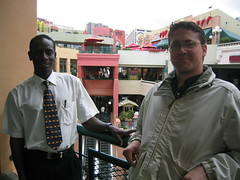 But none the less, I was faithful to my duties with the ministry, manning info booths, handing out brochures at the minsitry faires and churches and so on, helping promote the two trips (one to Uganda, one to Costa Rica) that Believers World Outreach (BWO) was coordinating for the Rock. I even got to (along with one of the other Missions Ministry leaders) give the pastor from Uganda a tour of San Diego one Saturday afternoon, and hear all about his ministry. Pastor Benjamin kept asking whether I was going to come to Uganda–I want to go on the trip, but I can’t, I got school, that’s my first commitment.
But none the less, I was faithful to my duties with the ministry, manning info booths, handing out brochures at the minsitry faires and churches and so on, helping promote the two trips (one to Uganda, one to Costa Rica) that Believers World Outreach (BWO) was coordinating for the Rock. I even got to (along with one of the other Missions Ministry leaders) give the pastor from Uganda a tour of San Diego one Saturday afternoon, and hear all about his ministry. Pastor Benjamin kept asking whether I was going to come to Uganda–I want to go on the trip, but I can’t, I got school, that’s my first commitment.
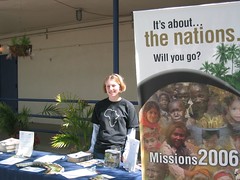 The first time anyone suggested to me that I should consider going on the Costa Rica trip, I kind of brushed it off: the dates were impossible, conflicting with school, just like the Uganda trip, and besides which, I was more interetested in the (Korean) Festival of Life that Horizon was doing in the fall anyway, why would I even think about going to Costa Rica instead? I couldn’t possibly get time off work for all of those trips could I?
The first time anyone suggested to me that I should consider going on the Costa Rica trip, I kind of brushed it off: the dates were impossible, conflicting with school, just like the Uganda trip, and besides which, I was more interetested in the (Korean) Festival of Life that Horizon was doing in the fall anyway, why would I even think about going to Costa Rica instead? I couldn’t possibly get time off work for all of those trips could I?
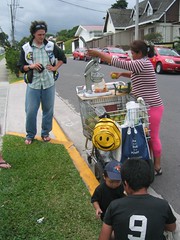 And then one day I was at home cleaning up, and came across a stray flyer for the Costa Rica trip. As I looked at the flyer one more time, I realized that the dates for the Costa Rica trip weren’t the schedule conflict I thought they were. Our graduation was the last week of June, and the Costa Rica trip was not until the first week of July. That’s not a conflict. Then I really had to pray about whether I should go on the trip, since my excuses not to go were starting to unravel.
And then one day I was at home cleaning up, and came across a stray flyer for the Costa Rica trip. As I looked at the flyer one more time, I realized that the dates for the Costa Rica trip weren’t the schedule conflict I thought they were. Our graduation was the last week of June, and the Costa Rica trip was not until the first week of July. That’s not a conflict. Then I really had to pray about whether I should go on the trip, since my excuses not to go were starting to unravel.
 But in faith, I pursued the idea. The biggest hurdle I could see about going on that trip was not the money but getting the time off work. I wasn’t about to quit my job over a two week mission trip, especially after they’d been so accomodating to give me so much (unpaid) time off already for HSE. It seemed like a lot to ask, I was already taking three weeks off in June to go to Poland, and here I was asking for another two weeks off only two weeks after I get back? My project manager laughed in my face and joked about how much he likes using the big red “denied” stamp, when I threw out the idea of taking more time off, but conceded that (per company policy) I could put in the request if I wanted anyway and “we’d see” whether they could accomodate or not.
But in faith, I pursued the idea. The biggest hurdle I could see about going on that trip was not the money but getting the time off work. I wasn’t about to quit my job over a two week mission trip, especially after they’d been so accomodating to give me so much (unpaid) time off already for HSE. It seemed like a lot to ask, I was already taking three weeks off in June to go to Poland, and here I was asking for another two weeks off only two weeks after I get back? My project manager laughed in my face and joked about how much he likes using the big red “denied” stamp, when I threw out the idea of taking more time off, but conceded that (per company policy) I could put in the request if I wanted anyway and “we’d see” whether they could accomodate or not.
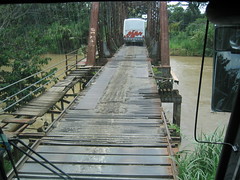 I spent a lot of time in prayer (even had others praying for me too!), it seemed impossible, but we all know that’s exactly the conditions necssary for God to do a miracle. Revelation 3:7 says that when God opens a door, no man can shut it, and when God closes a door, no man can open it. And true to that word, nothing, not even my antagonistic to Christianity project manger at work couldn’t shut the door God was opening before me; my vacation request came back a week later with the approved stamp on it. Okay, I’m going to Costa Rica then. And that was it.
I spent a lot of time in prayer (even had others praying for me too!), it seemed impossible, but we all know that’s exactly the conditions necssary for God to do a miracle. Revelation 3:7 says that when God opens a door, no man can shut it, and when God closes a door, no man can open it. And true to that word, nothing, not even my antagonistic to Christianity project manger at work couldn’t shut the door God was opening before me; my vacation request came back a week later with the approved stamp on it. Okay, I’m going to Costa Rica then. And that was it.
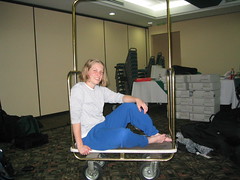 Originally, I was torn between which ministry I should sign up for–wanting to do both tech and evangelism ministries. I loved them both, but in different ways. When we were at LAX before our flight meeting the rest of the team, and had everyone stand up with their ministry team I stood up with both teams. Only, even right there I was beginning to realize something important, if I tried to be on both teams, I would really be fully devoted to neither. I realized I couldn’t “do both” with an undivided heart, I needed to pick. I prayed, and the word I got was that the two teams had different opportunities to offer, but that it didn’t matter which I picked, just to pick one and go for it with a full undivided heart.
Originally, I was torn between which ministry I should sign up for–wanting to do both tech and evangelism ministries. I loved them both, but in different ways. When we were at LAX before our flight meeting the rest of the team, and had everyone stand up with their ministry team I stood up with both teams. Only, even right there I was beginning to realize something important, if I tried to be on both teams, I would really be fully devoted to neither. I realized I couldn’t “do both” with an undivided heart, I needed to pick. I prayed, and the word I got was that the two teams had different opportunities to offer, but that it didn’t matter which I picked, just to pick one and go for it with a full undivided heart.
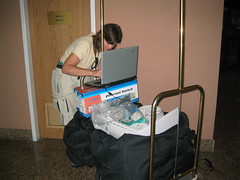 At the airport I’d already felt the bond of geekhood with Leslie and Mark as I (and many of the others not on the tech team) helped unload the uhaul of computers and bubble wrap the components and stuffing them into duffel bags to take as checked baggage–each passenger in our group was getting a full PC checked in under their name as their second suitcase. And so I picked tech.
At the airport I’d already felt the bond of geekhood with Leslie and Mark as I (and many of the others not on the tech team) helped unload the uhaul of computers and bubble wrap the components and stuffing them into duffel bags to take as checked baggage–each passenger in our group was getting a full PC checked in under their name as their second suitcase. And so I picked tech.
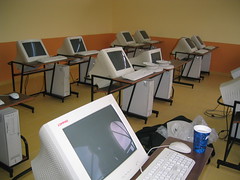 The really cool thing about being on the tech team was it really was an eye-opener to me that missions can be as unique as you are, and that ministry doesn’t have to fit into a nice neat box of what other people say ministry is about, that there’s infinitely many ways to serve the Lord within your interests and talents. God didn’t make us all different to serve him in the exact same way.
The really cool thing about being on the tech team was it really was an eye-opener to me that missions can be as unique as you are, and that ministry doesn’t have to fit into a nice neat box of what other people say ministry is about, that there’s infinitely many ways to serve the Lord within your interests and talents. God didn’t make us all different to serve him in the exact same way.
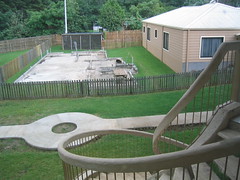 At each site where we delivered a set of computers, we would ask the church what they were going to do with the computers. Project Abraham was going to help women learn job skills so they could escape the traps of poverty and prostitution. La Vina was going to help students complete their high school education. Each place had a unique ministry, and our contribution had potential for long-term impact, by enabling these different churches to do effective ministry.
At each site where we delivered a set of computers, we would ask the church what they were going to do with the computers. Project Abraham was going to help women learn job skills so they could escape the traps of poverty and prostitution. La Vina was going to help students complete their high school education. Each place had a unique ministry, and our contribution had potential for long-term impact, by enabling these different churches to do effective ministry.
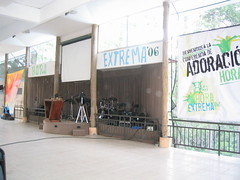 Sure, I might not have led a single person in a “salvation prayer” while I was there, but that doesn’t make the ministry we did less important.
Sure, I might not have led a single person in a “salvation prayer” while I was there, but that doesn’t make the ministry we did less important.
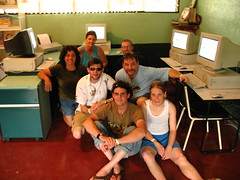 I think the most personally touching moment on the trip was in Jaco Beach when we delivered a set of 6 computers to a one-room Christian school-house (five in the classroom, and one at the teacher’s home). We’d picked up a really cheap printer in San Jose that she didn’t know she was getting. When we pulled out the box with the brand new printer from our black duffel bags, and Mike explained in broken Spanish that we were giving her a printer, you would have thought it was Christmas! She was so excited she was crying, the language didn’t matter, I could see her joy even if I couldn’t understand most of her words. To us the printer may have seemed like “not much”, but to her, it was something she never would have been able to afford on her own, a tool for her ministry that made the computers all the more valuable.
I think the most personally touching moment on the trip was in Jaco Beach when we delivered a set of 6 computers to a one-room Christian school-house (five in the classroom, and one at the teacher’s home). We’d picked up a really cheap printer in San Jose that she didn’t know she was getting. When we pulled out the box with the brand new printer from our black duffel bags, and Mike explained in broken Spanish that we were giving her a printer, you would have thought it was Christmas! She was so excited she was crying, the language didn’t matter, I could see her joy even if I couldn’t understand most of her words. To us the printer may have seemed like “not much”, but to her, it was something she never would have been able to afford on her own, a tool for her ministry that made the computers all the more valuable.
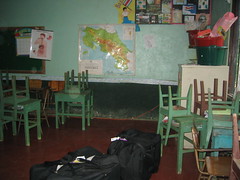 Some of the issues that we came across in doing our work were fairly interesting. That one room schoolhouse was directly wired into the power-grid, there was no breaker box, and the grounding was not properly grounded, so if you touched the cases of the machinies you’d get a nasty shock. And this is a classroom where there were to be little kids!
Some of the issues that we came across in doing our work were fairly interesting. That one room schoolhouse was directly wired into the power-grid, there was no breaker box, and the grounding was not properly grounded, so if you touched the cases of the machinies you’d get a nasty shock. And this is a classroom where there were to be little kids! 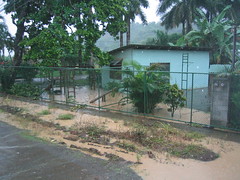 We ended up realizing that if we routed the power from a different outlet it was less of an issue, though it did affect the configuration of where we eneded up placing the computers. At the same site, I almost knocked a flimsy top-heavy bookshelf over onto myself, narrowly catching it and preventing it from falling. But then the teacher realized the danger that one of her students could accidently do the same thing and have the bookshelf fall over on them, so we helped her to fasten the top of the bookshelf to the window bars with sturdy wire, to make it more difficult to topple over.
We ended up realizing that if we routed the power from a different outlet it was less of an issue, though it did affect the configuration of where we eneded up placing the computers. At the same site, I almost knocked a flimsy top-heavy bookshelf over onto myself, narrowly catching it and preventing it from falling. But then the teacher realized the danger that one of her students could accidently do the same thing and have the bookshelf fall over on them, so we helped her to fasten the top of the bookshelf to the window bars with sturdy wire, to make it more difficult to topple over.
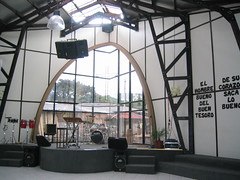 At Project Abraham, we heard some amazing testimonies of how God had provided all the lumber for their church building. Apparently wood is not a very common building material in Costa Rica because of termites, and you have to treat the wood with chemicals that are banned in the States, so normally building with wood is expensive. Only they’d come across a free source of lumber, shipping crates. Before they asked for the wood, the crates were being burned after the cargo in them was unloaded. So they resourcefully hired local labor
At Project Abraham, we heard some amazing testimonies of how God had provided all the lumber for their church building. Apparently wood is not a very common building material in Costa Rica because of termites, and you have to treat the wood with chemicals that are banned in the States, so normally building with wood is expensive. Only they’d come across a free source of lumber, shipping crates. Before they asked for the wood, the crates were being burned after the cargo in them was unloaded. So they resourcefully hired local labor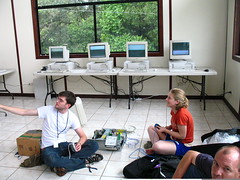 (at a competitive wage too) to pull out all the nails and stapled on carpet bits and refinished the wood, and built a beautiful wood and glass sanctuary in the middle of what was once a coffee farm–everything they were building with was donated or at a severe discount, God was hooking them up. Even the governement provided parts like paved roads and light poles was a crazy story of God’s provision…normally they’d have to pay for those things to be built out to their neighborhood, but all of a sudden the governement just decides to do it at no cost to them, saving them a considerable sum. They also were building a few homes for orphans on their property, and had some American missionaries working there.
(at a competitive wage too) to pull out all the nails and stapled on carpet bits and refinished the wood, and built a beautiful wood and glass sanctuary in the middle of what was once a coffee farm–everything they were building with was donated or at a severe discount, God was hooking them up. Even the governement provided parts like paved roads and light poles was a crazy story of God’s provision…normally they’d have to pay for those things to be built out to their neighborhood, but all of a sudden the governement just decides to do it at no cost to them, saving them a considerable sum. They also were building a few homes for orphans on their property, and had some American missionaries working there.
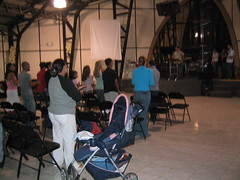 As we were pulling out on the last day we were at Project Abraham, running late and nearly missing dinner, we were blessed, because we were running late trying to get things finished up for them, we were still their when their (mid-week?) church service was starting and got to sit in on a few minutes of their heavenly rockin’ Spanish worship. I may not speak the language, but worship of God is a rather universal language. On the entire two weeks we were there, that was the only church service I got to see, mostly we just held our own “services” every night at our hotel, but I was quite glad I got to see a real local serivce.
As we were pulling out on the last day we were at Project Abraham, running late and nearly missing dinner, we were blessed, because we were running late trying to get things finished up for them, we were still their when their (mid-week?) church service was starting and got to sit in on a few minutes of their heavenly rockin’ Spanish worship. I may not speak the language, but worship of God is a rather universal language. On the entire two weeks we were there, that was the only church service I got to see, mostly we just held our own “services” every night at our hotel, but I was quite glad I got to see a real local serivce.
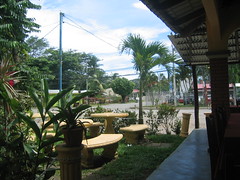 Jaco Beach was kind of dusty and dirty, all but the main street unpaved, drugs a rampant problem in their small beach-front tourism town. As we wandered into shops, to purchase touristy items, the aroma of pot lingered, and it was quite clear that touristy merchandise was not the only thing for sale. In Costa Rica prostitution is actually not illegal, in San Jose we had seen signs saying essent ially don’t use prostitutes, however, there its merely a suggestion.
Jaco Beach was kind of dusty and dirty, all but the main street unpaved, drugs a rampant problem in their small beach-front tourism town. As we wandered into shops, to purchase touristy items, the aroma of pot lingered, and it was quite clear that touristy merchandise was not the only thing for sale. In Costa Rica prostitution is actually not illegal, in San Jose we had seen signs saying essent ially don’t use prostitutes, however, there its merely a suggestion. 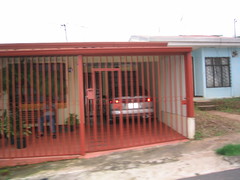 It is traditional for the houses to have small front yards (patios really) that are fenced in with 8 foot tall iron fences and in many cases completely enclosed by having a roof. Our translators and bus drivers explained that it was not simply style, but an issue of safety–it can’t really keep people from breaking in, but it will slow them down at least. Even the ATMs in Costa Rica are fortified, instead of just being a machine on a wall that you walk up to, like in the states, they are enclosed in glassed in huts and you have to spipe your ATM card to even get to the ATM.
It is traditional for the houses to have small front yards (patios really) that are fenced in with 8 foot tall iron fences and in many cases completely enclosed by having a roof. Our translators and bus drivers explained that it was not simply style, but an issue of safety–it can’t really keep people from breaking in, but it will slow them down at least. Even the ATMs in Costa Rica are fortified, instead of just being a machine on a wall that you walk up to, like in the states, they are enclosed in glassed in huts and you have to spipe your ATM card to even get to the ATM.
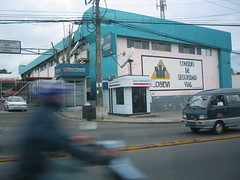 Not seeing any in Jaco Beach, we asked about police, and were told there aren’t any. “Why not?” we asked. There aren’t enough police, they’re all dealing with “real crime”–they don’t have enough forces to deal with petty crime like people not following traffic laws or people using illegal drugs. There was an estate we’d pass every day, when we walked into town, of a drug-lord that had a tall fence with broken bottles nailed to the top of the fence surrounding the property to deter people from scaling the fence, the Costa Rican equivalent of barbed wire. While we were in Jaco, this particular drug lord was busted. We can’t say for sure, but our suspicion was just the mere presense of the light of Christ, having so many Christians invade the small town, was having a supernatural impact.
Not seeing any in Jaco Beach, we asked about police, and were told there aren’t any. “Why not?” we asked. There aren’t enough police, they’re all dealing with “real crime”–they don’t have enough forces to deal with petty crime like people not following traffic laws or people using illegal drugs. There was an estate we’d pass every day, when we walked into town, of a drug-lord that had a tall fence with broken bottles nailed to the top of the fence surrounding the property to deter people from scaling the fence, the Costa Rican equivalent of barbed wire. While we were in Jaco, this particular drug lord was busted. We can’t say for sure, but our suspicion was just the mere presense of the light of Christ, having so many Christians invade the small town, was having a supernatural impact.
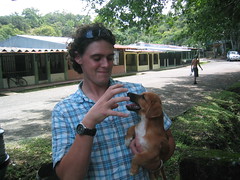 And then there was the day we spent in Quepos. It was only a single day there, another beach-town at least an hour’s drive from Jaco. We were delivering a small set of computers to a family of American missionaries who were starting a church in Quepos. They had several kids (mostly boys), and uprooted their whole family from midwestern Horizion Church-Plant to come start a church in Quepos. I was quite fascinated to get to talk with Pastor Kim’s wife about her experiences as a missionary family. The kids had been put back a grade or two when they first got there because of the language issues, but they were quick to learn the language, much quicker than their parents. But Pastor Kim takes it in good stride that the locals call him El Pollo Loco (the crazy chicken)–everybody knows who he is.
And then there was the day we spent in Quepos. It was only a single day there, another beach-town at least an hour’s drive from Jaco. We were delivering a small set of computers to a family of American missionaries who were starting a church in Quepos. They had several kids (mostly boys), and uprooted their whole family from midwestern Horizion Church-Plant to come start a church in Quepos. I was quite fascinated to get to talk with Pastor Kim’s wife about her experiences as a missionary family. The kids had been put back a grade or two when they first got there because of the language issues, but they were quick to learn the language, much quicker than their parents. But Pastor Kim takes it in good stride that the locals call him El Pollo Loco (the crazy chicken)–everybody knows who he is. 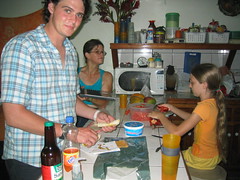 While the pastor’s wife made homemade salsa (don’t you really feel like you’re in Costa Rica!) in their kitchen, she shared some of the realities, the disillusionment that its hard being a missionary, and they didn’t do a whole lot of ministry the first year they were there, they spent a lot of that time getting their hearts adjusted. It was really good to hear everything she had to say, what its really like to be a missionary for the long haul and not just two weeks.
While the pastor’s wife made homemade salsa (don’t you really feel like you’re in Costa Rica!) in their kitchen, she shared some of the realities, the disillusionment that its hard being a missionary, and they didn’t do a whole lot of ministry the first year they were there, they spent a lot of that time getting their hearts adjusted. It was really good to hear everything she had to say, what its really like to be a missionary for the long haul and not just two weeks.
The town itself was a bit of a sight, the majority of the downtown having sidewalks raised a foot or more from the street (apparently it floods a lot), with deeper channels carved along the edge of the sidewalk for sewage and/or storm drainage, and there are steps and cement slabs connecting the street to the sidewalks at interections and stores. God forbid anyone with a wheelchair should ever visit Quepos, this is not an “accessible” place in the slightest. But the town had a charm to it that Jaco didn’t, it was a place I wouldn’t have minded spending more time.
By the time we came home from Costa Rica, I was ready to come home.
Jessica’s Website -> Faith -> Missions -> Costa Rica 2006
